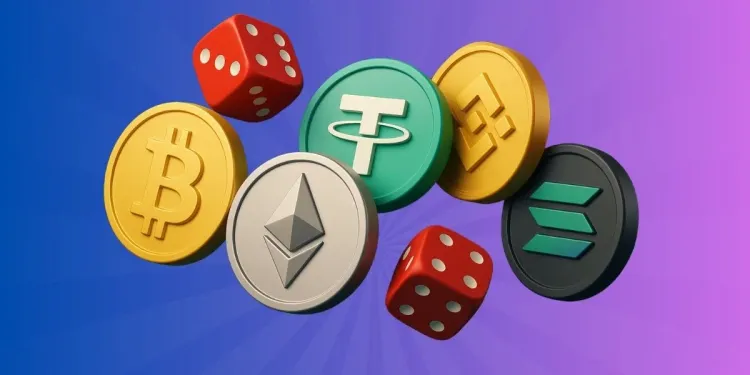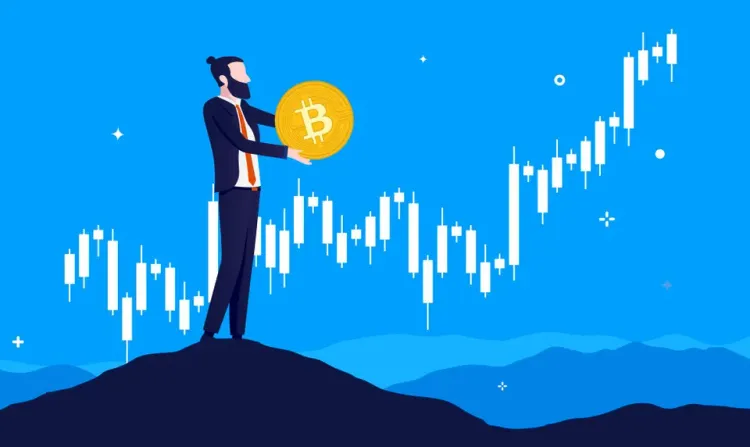Cryptocurrency Guide: Risks, Rewards, and Underlying Technology

Bitcoin and cryptocurrencies are getting plenty of attention right now, and the buzz isn't just coming from its usual users and supporters. Traditional stock traders, investment firms, banks, and even retail investors are now paying attention, and many are buying.
This week, Bitcoin's price has reached a new record high, briefly flirting with the $70k level, continuing its rapid upward trajectory that started in late 2023. Bitcoin's rise also helped push the price of altcoins, including Ethereum and Solana. So, what's driving this rally and increased attention on Bitcoin and cryptos?
According to crypto watchers traders, the current sizzling price action is partly driven by the rising demand for the spot Bitcoin Exchange-Traded Funds or ETFs. These ETFs work like common stocks, which allow retail traders and the average man to dabble in crypto without worrying about the complicated process of opening a wallet and securing the keys. While Bitcoin's price has been testing the $70k level recently, it's now possible to invest even with 'smaller amounts'; we don't recommend buying or investing in spot Bitcoin ETFs without due diligence.
Revisiting the cryptocurrency
A cryptocurrency is a digital currency that serves as an alternative payment method or even a speculative investment. Unlike traditional currencies, cryptos don't rely on a regulating authority or a central issuing organization; instead, they rely on a decentralized system to track transactions and create new digital coins.
Cryptos, like Bitcoin and Ethereum, get their name from the cryptographic techniques used to verify and approve transactions without relying on a bank or a regulator. In addition to its independence, blockchain technology is the other primary appeal of Bitcoin and altcoins.
A blockchain is a set of connected blocks of information on the online ledger. On each block is a set of transactions that have been independently checked and verified. The platform requires that each new block pass verification before confirmation, making duplicating or forgiving transactions impossible. Also, the contents of an online ledger must be agreed upon by the network of computers that manage the ledger. The number of confirmations varies depending on the crypto. For example, Bitcoin (BTC) requires 3 confirmations, while Solana (SOL) requires just 1 confirmation.

Experts agree that blockchain can benefit different industries, including supply chains, financing, and processes like crowdfunding and online funding. JPMorgan Chase & Co. is a top financial company using blockchain technology to streamline payments.
The online gambling industry is among the first to integrate blockchain into its operations. Many online casinos today accept Bitcoin and altcoins for payments, promising faster and more private transactions. Also, the blockchain has become the basis of many provably fair games like crash gambling, giving rise to crypto casinos.
Cryptocurrency rewards, explained
Cryptocurrencies are changing the way we see and use money for transactions. Thanks to its decentralized platform, traditional intermediaries like central banks and monetary institutions no longer play a role in enforcing trust among market participants. Cryptos empower everyone since they can participate at any time, and their use eliminates the possibility of a single point of failure.
The absence of an intermediary like a central bank also promotes fast and convenient transactions. In decentralized finance, payments or flash loans can be completed within seconds and possibly without collateral backing. These decentralized transfers are protected by using public and private kets, and players are encouraged to participate through different forms of incentive systems, like proof-of-stake and proof-of-work.
Finally, investing in cryptocurrencies can also generate profits for the holder. The cryptocurrency market is now estimated at $2 trillion, growing fast thanks to the introduction of the spot Bitcoin ETFs. You can earn money by buying and trading cryptocurrencies and benefit from their price appreciation. If you have a solid trading strategy, use charts to track crypto prices, and have a strong stomach for volatility, there's a possibility that you can earn money.
Right now, the remittance economy is crypto's most prominent use case. Bitcoin and altcoins are popularly used as intermediaries to streamline money transfers. Here, a fiat currency (say a USD) is converted to a cryptocurrency, and it's transferred across borders. Then, it's converted into the local currency without the help of a third party.
Compared to traditional methods of money remittances, crypto remittances boast faster processing times, lower transaction costs, and transparency.
Cryptocurrency risks, explained
For most, the main appeal of using cryptocurrencies lies in their anonymous character. Experts share that although you don't share your name or other information, your transactions still 'leave a digital trail' that government agencies can follow.
It means that your transactions aren't completely private, and there's a chance that authorities can still track your activities. However, the promised privacy and anonymity remain a strong draw for many individuals to use cryptos for transactions, especially those involved in criminal activities. Reports say that crypto is the currency of choice for many dark web transactions, and many hackers also use it for ransomware activities.
Another marketed benefit of cryptocurrency is its 'decentralization,' which means that control and wealth are distributed among many participants on the blockchain.
In reality, ownership of Bitcoin and altcoins is highly concentrated. In one survey, only 100 addresses own roughly 15% of the Bitcoin in circulation and total value. Also, with the approval of spot Bitcoin ETFs, financial institutions are the newest players in the industry, and companies like BlackRock are aggressively buying and holding Bitcoin.
Security risks are also associated with holding and storing Bitcoin and other cryptos.
Cryptocurrency exchanges often market their platforms as highly secure, where you can confidently buy, sell, and store your coins. However, these wallets and exchanges can happen, often resulting in the theft of millions or even hundreds of millions of dollars in cryptocurrencies. The latest significant hacking involved the Poloniex hot wallets, with $114 million worth of coins reportedly stolen.
Cryptos, as a new asset class, are now popularly traded in exchanges. Yes, many traders and enthusiasts have reportedly earned from trading these coins. Anecdotal records show market participants lose money from trading Bitcoin and cryptos due to price volatility. If you're eager to join the club of traders, you must follow strict and accurate price monitoring. Bitcoin, the world's most valuable crypto, has experienced erratic price movements in recent months, rising to almost $65,000 in November 2021, then dropping to $20,000 after a year and a half, and today, it's testing the $70,000 level.
Some say cryptocurrency is a fad and a speculative bubble, and one must be careful before investing.
We can't deny some things about Bitcoin and cryptos right now. There's increased volatility, price is on an upswing, and SEC's approval of the spot Bitcoin ETFs and the participation of heavyweights in financial sector like BlackRock, Grayscale and Fidelity, pushes Bitcoin and this new asset class further into mainstream, attracting new participants. The thrill and excitement are always there, but we recommend practicing due diligence.




